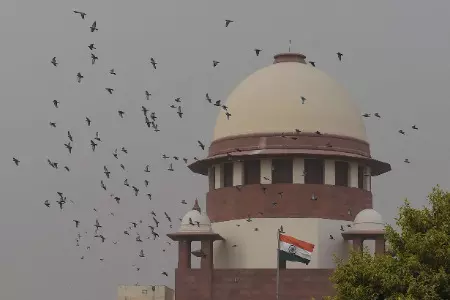SC takes suo motu note of ED summoning lawyers for legal advice

New Delhi: The Supreme Court has initiated a suo motu case over the issue of investigation agencies summoning lawyers who offer opinion or represent parties in cases to examine if they can be put to notice.
A bench of Chief Justice B R Gavai and Justices K Vinod Chandran and N V Anjaria will hear the matter on July 14, when the court reopens after the summer break.
The action comes in the wake of the Enforcement Directorate (ED) summoning a couple of senior lawyers – Arvind Datar and Pratap Venugopal.
However, the ED on June 20 directed its investigating officers not to issue summons to any advocate in a money laundering investigation being carried out against their client, adding that exception to this rule can only be made after "approval" by the agency's director.
The central probe agency, tasked with combating money laundering crimes, issued the circular for the guidance of its field formations, stating that "no summons" should be issued to any advocate in violation of Section 132 of the Bhartiya Sakshya Adhiniyam (BSA), 2023.
"Further, if any summons needs to be issued under the exceptions carved out in proviso to Section 132 of the BSA, 2023, the same shall be issued only with the prior approval of the director, ED," the agency said.
The counsel had offered legal advice to Care Health Insurance Limited on the employee stock ownership plan given to Rashmi Saluja, former chairperson of Religare Enterprises.
The summons were condemned by the Supreme Court Bar Association (SCBA) and the Supreme Court Advocates-on-Record Association (SCAORA), calling it a "disturbing trend" that struck at the very foundations of the legal profession.
The bar bodies had urged the chief justice of India to take suo motu cognisance of the matter.
On June 25, a bench of Justices K V Viswanathan and N Kotiswar Singh observed the legal profession was an integral component of the process of administration of justice and allowing police or probe agencies to directly summon lawyers for advising clients would seriously undermine the autonomy of legal profession and was a "direct threat" to the independence of justice administration.
The bench had framed a couple of questions in the matter.
"Some of the questions which arise for consideration are: (1) when an individual has an association with a case only as a lawyer advising the party, could the investigating agency/prosecuting agency/police directly summon the lawyer for questioning?" the bench asked.
The other question read, "Assuming that the investigating agency or prosecuting agency or police have a case that the role of the individual is not merely as a lawyer but something more, even then, should they be directly permitted to summon or should a judicial oversight be prescribed for those exceptional criteria?"
Both points aside from other issues, the top court said, could arise and require addressal on a comprehensive basis for "what is at stake is the efficacy of the administration of justice and the capacity of the lawyers to conscientiously, and more importantly, fearlessly discharge their professional duties".
The bench said since it was a matter directly impinging on the administration of justice, "to subject a professional... when he is a counsel in the matter... prima facie appears to be untenable, subject to further consideration by the court".
The order came when the top court was hearing a plea of a Gujarat-based advocate, challenging an order of the high court passed on June 12.
The high court in March 2025 refused to quash a notice summoning the lawyer before the police in a case against his client.
The top court, however, directed the state not to summon him till further orders and stayed the operation of the police's notice issued to him.
It said the lawyers engaged in legal practice, apart from their fundamental right under Article 19 (1)(g) of the Constitution, had certain rights and privileges guaranteed being legal professionals and further as a result of statutory provisions.
Article 19 (1)(g) of the Constitution deals with the right to practise any profession or to carry on any occupation, trade or business.
Underlining the issue as important, the bench called for assistance of the attorney general, the solicitor general, chairperson of the Bar Council of India, and the presidents of the SCBA and SCAORA.
The top court had asked the apex court registry to place the case files before the CJI for passing appropriate directions.



